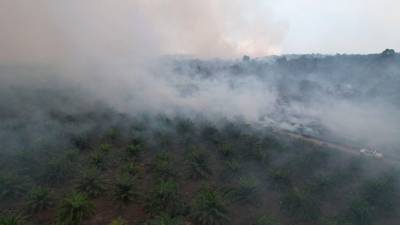MUKAH: Wildfires raging in plantations and jungles in Mukah, Sarawak surged beyond 110ha in size as of yesterday morning.
Aerial water bombing by the Fire and Rescue Department Air Wing Unit was carried out and reduced hotspots to 75ha at noon.
Ashes from the blaze are causing widespread air pollution.
The Sarawak Natural Resources and Environment Board said the Air Pollutant Index (API) reading in Mukah hit the 160 unhealthy mark yesterday morning, with the district enveloped in haze.
“The Mukah population have been advised to stop outdoor activities and use face masks at all times,” the board said, adding that firefighters have been deployed and are using aerial tactics to contain the wildfires.
The Fire and Rescue Department said it has deployed helicopters with water bombing capabilities to douse the Mukah fire.
“Our helicopters can carry out up to 15 aerial sorties. However, the fire is spreading closer to the Mukah Airport runway and into the Universiti Teknologi Mara Mukah campus, threatening the people there.
“Aerial water bombings are in full swing and our ground teams are trying to use total flooding methods.”
The Marudi district is also seeing an inferno raging in plantations, firefighters in Kota Samarahan in southern Sarawak are battling a landfill blaze and teams in Serian district are fighting another fire in Kampung Danau.
Sarawak State Disaster Management Committee chairman Datuk Amar Dougglas Uggah said the state is on red alert for wildfires and haze, as well as water shortages in numerous interior districts caused by worsening drought.
On Wednesday, Bakelalan state assemblyman Baru Bian confirmed that thousands of people living in eight localities in his constituency along the Sarawak-Kalimantan border had run out of drinking water due to weeks of drought.
Bian is liaising with state government authorities to arrange emergency water supply delivery for his remote constituency.
Bakelalan constituency, which stretches from the Lawas district to the Kalimantan border, has a total population of about 50,000 people.
